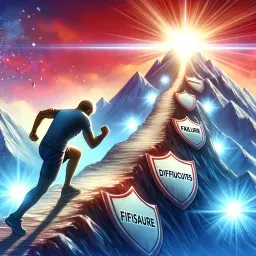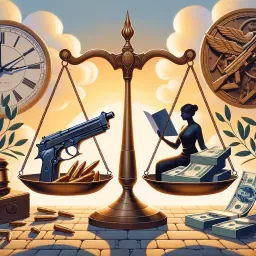Never interrupt your enemy when he is making a mistake

0
0
0
0
- Meaning
- The phrase suggests that observation and prudence are virtues in the context of conflicts or competitions. It touches on concepts like psychological warfare, timing in decision-making, and understanding the weaknesses of the adversary. Philosophically, it could also address the wisdom in human errors, emphasizing that letting others act without interference can sometimes lead to favorable outcomes without additional effort.
- Allegory
- The allegorical image features a sage representing prudence. The chess game illustrates conflict and strategic decisions, while the calm and serene environment symbolizes the importance of patience in the observation process. The mountains in the background reinforce the idea of long-term wisdom, highlighting that sometimes the best course of action is to stay back and let events unfold.
- Applicability
- In everyday life, this can be applied by showing patience towards colleagues or friends who might be making wrong decisions. Instead of interrupting or correcting them immediately, it might be more beneficial to let them continue on their path, as it could lead them to understand their mistakes on their own, thus reinforcing their learning and autonomy.
- Impact
- This phrase has had a notable impact in various fields, including military strategy and management. It is often cited in discussions on emotional intelligence, negotiation, and conflict management. In popular culture, it resonates in the business world, where it is used to illustrate the importance of patience and perspective. It is also sometimes mentioned in decision-making contexts where prudence is required.
- Historical Context
- Although the phrase does not seem to have a precise date, it can reasonably be attributed to the early 19th century, a period during which Napoleon was active, particularly during his military campaigns.
- Criticisms
- There have been criticisms around this phrase, especially regarding its interpretation as a call for inaction. Some argue that proactive action can often prevent mistakes, and thus, this phrase might encourage a passive attitude that is not always beneficial. Arguments can also be made that in some situations, intervention can prevent serious consequences, even if the other party is making a mistake.
- Variations
- There are variations of this advice in other cultures. For instance, in Asian traditions like Taoism, the idea of letting things be without resistance is valued. This underscores a broader cultural interpretation that sees patience and passive observation as forms of wisdom.
-

Victory belongs to the most persevering.
-

Impossible is not French.
-

She warned him not to be deceived by appearances, for beauty is found within.
-

Even miracles take a little time.
-

The journey begins, and the voyage is already complete.
-

You must be bold, daring.
-

You can’t marry a man you just met.
-

Finance is a gun. Politics is knowing when to pull the trigger.
-

Once we accept our limits, we go beyond them.
-

A ray of sunshine is enough to sweep away many shadows.
-

We have met the enemy and they are ours.
No Comments